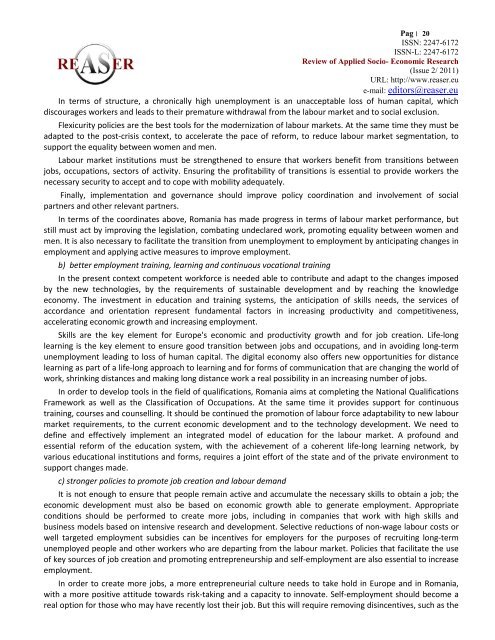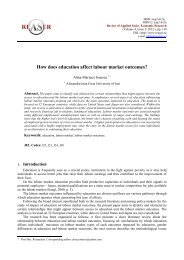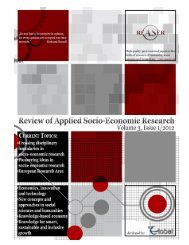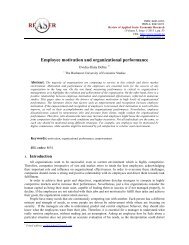Volume 2, ISSUE2/2011 - Review of Applied Socio-Economic ...
Volume 2, ISSUE2/2011 - Review of Applied Socio-Economic ...
Volume 2, ISSUE2/2011 - Review of Applied Socio-Economic ...
You also want an ePaper? Increase the reach of your titles
YUMPU automatically turns print PDFs into web optimized ePapers that Google loves.
Pag׀ 20 ISSN: 2247-6172ISSN-L: 2247-6172<strong>Review</strong> <strong>of</strong> <strong>Applied</strong> <strong>Socio</strong>- <strong>Economic</strong> Research(Issue 2/ <strong>2011</strong>)URL: http://www.reaser.eue-mail: editors@reaser.euIn terms <strong>of</strong> structure, a chronically high unemployment is an unacceptable loss <strong>of</strong> human capital, whichdiscourages workers and leads to their premature withdrawal from the labour market and to social exclusion.Flexicurity policies are the best tools for the modernization <strong>of</strong> labour markets. At the same time they must beadapted to the post-crisis context, to accelerate the pace <strong>of</strong> reform, to reduce labour market segmentation, tosupport the equality between women and men.Labour market institutions must be strengthened to ensure that workers benefit from transitions betweenjobs, occupations, sectors <strong>of</strong> activity. Ensuring the pr<strong>of</strong>itability <strong>of</strong> transitions is essential to provide workers thenecessary security to accept and to cope with mobility adequately.Finally, implementation and governance should improve policy coordination and involvement <strong>of</strong> socialpartners and other relevant partners.In terms <strong>of</strong> the coordinates above, Romania has made progress in terms <strong>of</strong> labour market performance, butstill must act by improving the legislation, combating undeclared work, promoting equality between women andmen. It is also necessary to facilitate the transition from unemployment to employment by anticipating changes inemployment and applying active measures to improve employment.b) better employment training, learning and continuous vocational trainingIn the present context competent workforce is needed able to contribute and adapt to the changes imposedby the new technologies, by the requirements <strong>of</strong> sustainable development and by reaching the knowledgeeconomy. The investment in education and training systems, the anticipation <strong>of</strong> skills needs, the services <strong>of</strong>accordance and orientation represent fundamental factors in increasing productivity and competitiveness,accelerating economic growth and increasing employment.Skills are the key element for Europe's economic and productivity growth and for job creation. Life-longlearning is the key element to ensure good transition between jobs and occupations, and in avoiding long-termunemployment leading to loss <strong>of</strong> human capital. The digital economy also <strong>of</strong>fers new opportunities for distancelearning as part <strong>of</strong> a life-long approach to learning and for forms <strong>of</strong> communication that are changing the world <strong>of</strong>work, shrinking distances and making long distance work a real possibility in an increasing number <strong>of</strong> jobs.In order to develop tools in the field <strong>of</strong> qualifications, Romania aims at completing the National QualificationsFramework as well as the Classification <strong>of</strong> Occupations. At the same time it provides support for continuoustraining, courses and counselling. It should be continued the promotion <strong>of</strong> labour force adaptability to new labourmarket requirements, to the current economic development and to the technology development. We need todefine and effectively implement an integrated model <strong>of</strong> education for the labour market. A pr<strong>of</strong>ound andessential reform <strong>of</strong> the education system, with the achievement <strong>of</strong> a coherent life-long learning network, byvarious educational institutions and forms, requires a joint effort <strong>of</strong> the state and <strong>of</strong> the private environment tosupport changes made.c) stronger policies to promote job creation and labour demandIt is not enough to ensure that people remain active and accumulate the necessary skills to obtain a job; theeconomic development must also be based on economic growth able to generate employment. Appropriateconditions should be performed to create more jobs, including in companies that work with high skills andbusiness models based on intensive research and development. Selective reductions <strong>of</strong> non-wage labour costs orwell targeted employment subsidies can be incentives for employers for the purposes <strong>of</strong> recruiting long-termunemployed people and other workers who are departing from the labour market. Policies that facilitate the use<strong>of</strong> key sources <strong>of</strong> job creation and promoting entrepreneurship and self-employment are also essential to increaseemployment.In order to create more jobs, a more entrepreneurial culture needs to take hold in Europe and in Romania,with a more positive attitude towards risk-taking and a capacity to innovate. Self-employment should become areal option for those who may have recently lost their job. But this will require removing disincentives, such as the








